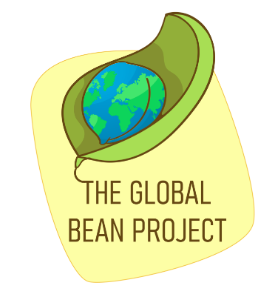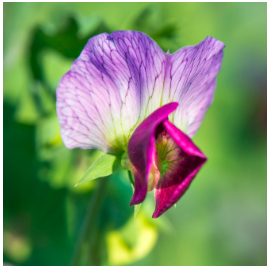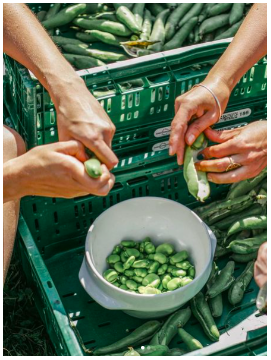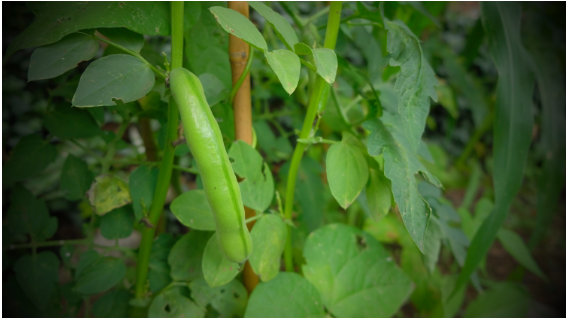
A few days ago, we talked with Romain Elleboudt, an agricultural facilitator of the 2000m2 project (also run by the Foundation on Future Farming) who, along with others, runs the online sessions for the Global Beans Project. He told us more about the ambition and structure of the network, as well as its positions regarding recent European declarations.
Seeds4All. What drives the Global Beans Project?
Romain. To get consumers to seriously consider legumes as an alternative to meat and thus contribute to the increase of legume production for human consumption. This is for two reasons: firstly, to bring about a change in dietary behaviour that is genuinely capable of reducing our GHG emissions; and secondly, to promote a better distribution and healthier use of the “earth resource”, and particularly European arable lands.
The European Union is a major producer of livestock products on the international market. Between 2010 and 2020, livestock production accounted for around 45% of the its final agricultural output. And this is very concretely reflected in our territories.
According to a study published by the European unit of Greenpeace in February 2019, 71% of the continent’s agricultural land is devoted to livestock farming, while half of it is arable land which could therefore be cultivated for the benefit of human food. And in total, 63% of European arable land is actually used for livestock feed.
Seeds4All. Can you tell us what the Global Beans Community looks like?
Romain. To date, the network has just over 50 partner organisations. Mostly European, but also based in India, the United States and Kenya. These are NGOs, agricultural research centres, agricultural cooperatives, universities… very diverse stakeholders, who all have an interest in collaborating to advance knowledge related to legumes, on a research level, in the field or regarding consumers.
Seeds4All. What kind of actions does the network implement?
Romain. All activities are organised online and explore all areas related to pulses, seeking to appeal to all the senses awakened by these super plants.
We have defined several pillars of work: thematic information sessions (on the diversity of beans, their nutritional values, their interest in terms of food security, etc.); discovery of “demonstration gardens” where the cultivation of different legumes is being experimented; virtual exchange of seeds; holding of culinary events to share recipes from all over the world based on legumes; and lastly, publication of technical fact sheets to disseminate knowledge related to the cultivation of legumes.

Each month, a global meeting is organised, gathering first the network’s partners, and leading then an open-to-the-public meeting. For the raison d’être of the Global Beans is twofold: bringing together professional operators to give meaning and dynamism to their desire to promote legumes; and allowing that their exchanges and efforts to raise awareness are brought to the widest possible audience.
Seeds4All. Recently, you organised an online seed exchange festival. A very interesting pioneering initiative given the difficult context of covid. Can you tell us how it went?
Romain. I would say it was a success! The exchanges were unique in a way, because the advantage of the online event is that we were able to bring together and connect people geographically very far apart. To make it relevant, we asked participants to tell us before the event what they were looking for in terms of seeds and what they had to offer. Finally, we chose to form groups based on the type of climate in which each person lived.

I, for example, led a group of 4 people who lived in cold countries and who were able to discuss and advise each other on the best varieties to grow in their climate. They exchanged addresses and then sent beans from one country to another!
All this was done very freely, we let the participants organise themselves and manage their exchanges. So we have no idea how many seeds were exchanged but the feedback was positive. A new festival of this type will be organised next year.
Seeds4All. Our newsletter focuses on the issue of protein crops in relation to the environment and food security. In particular, we address the recent proposal made by Austria to implement a Protein Plan for the European Union.
What is the reaction of the Global Beans to such an announcement and how could you envisage the implementation of a European Protein Plan?
Romain. Of course, we support the fact that European institutions are taking up these issues and undertaking to translate them into an ambitious policy for the EU’s protein independence.
But we were struck by the fact that the Commission – which had initially rejected the idea of a common strategy recommending instead that Member States should develop their protein independence via the CAP’s strategic plans – is now reversing its position in reaction to the start of a war. Thinking about sustainable agriculture and acting to make our production systems resilient should be a constant motivation, and not only a reaction to emergency situations.
Especially since the question of the EU’s protein strategy is very complex. Austria’s proposal and the position of many member states in the current crisis situation essentially prioritises finding an alternative to the EU’s dependence on animal feed. In our opinion, the urgency is to rely on legumes to feed the population as a priority. This obviously implies, and this is one of the objectives, to reduce our livestock and our meat consumption.
It is therefore a question of supporting the restructuring of the entire agricultural market: investing to support the production of legumes, promoting vegetarian diets, encouraging everyone to use short circuits… The ambition of a Protein Plan would be immense and should, in my opinion, be monitored so that pulses are the big winners of the potential reform.

Seeds4All. What role could the Global Beans play in this context?
Romain. As a large group of partners with potentially varied positions, the Global Beans cannot envisage the implementation of lobbying activities as such. But our mission already tends to support the emergence of a new European ambition in terms of access to proteins.
We would like to invest more, in the months to come, with pioneer farmers capable of participating in the increase of pulses’ sustainable production: by relaying their experiences, promoting their commitments to grow sustainable legumes, connecting them to networks…
Then of course, our desire to help people learn about these issues aims to reverse things from the bottom. And it’s already happening: meat consumption is decreasing, and vegetarian diets are on the rise. The objective now is to contribute to improving the quality, diversity and availability of pulses made in the EU, which we believe can only be accelerated through collaboration and exchange. We are therefore very grateful to the organisations that have joined us in this endeavour and of course, to the public already engaged with us!
Article from the SEEDS4ALL NEWSLETTER #15




